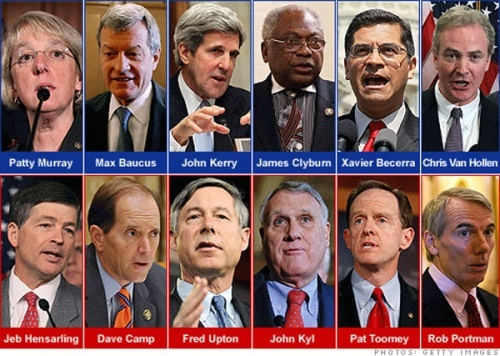
The failure is not in the quantitative, but in further exposing inability of the US political system to function. The “Super-committee” still has till Wednesday (November 23, 2011), but it is very likely that only a turkey will be delivered in time for Thanksgiving Day on Thursday. Further, while everyone complains about the automatic cuts provided in the event of failure by the Super-committee, the quantitative consequences are as valid as any that could have been otherwise reached through such negotiations. What is missing is the new “revenue,” that is taxes.
Lack of Political Will/Commitment:
AAA rated countries exhibit a strong political commitment of its legislative and executive political leaders to raise revenues. Much deeper fiscal cuts are not welcome by most objective economic observers –they could trigger recession in a still vulnerable economy where the US middle class is especially lagging the overall recovery from the lows of 2009. (Deeper fiscal cuts could even risk recession – Read: “Triggering Global Recession” -
diplomaticallyincorrect.org/films/blog_post/triggering-global-recession-by-ambassador-mo/32982). New data indicates that the US wealth gap is the highest in more than the last half-century. If not now, when will the US Congress be willing to raise taxes on the so-called “1%”.
Reform Needs Revenues & Spending Cuts:
Taxing the wealthiest has little to do with “taxing” what Republican leaders call the “job creators.” Legislative tax-initiatives to provide tax incentives for hiring have also failed in Congress. Further, many of the “1%” as WARREN BUFFET have also called for additional taxes on the super-rich as part of an overall deficit reduction plan, but have been ignored or even criticized by Republicans. It is the failure to generate more revenues as much as spending cuts that has to be part of an economically as well as politically viable fiscal & deficit reduction plan.
An Extended Period of Gridlock Through Elections & Beyond?
It is lack of political will or capacity to cooperate that caused the last S&P downgrade of US debt as much as any other consideration. (Read:
diplomaticallyincorrect.org/films/blog_post/sp-downgrades-us-debt-by-ambassador-mo/33202). There is also risk that agreement cannot be reached on other considerations that require some affirmative action – as the so-called Bush era tax reductions on wealthier and middle income earners. Is failure to reach agreement at the Super-committee a reflection of an ideological inflexibility – in part yes? However, this also appears to be part of a calculated election strategy, but that is still a year away. While there is a need to reach agreement on a broader fiscal plan for the US sooner or later, it now seems unlikely for another year as election maneuvering takes primacy. And, why should we think that political/Congressional agreement would be any more likely after the elections?
Related Reports at “International Financial Crisis Channel” -
diplomaticallyincorrect.org/c/international-financial-crisis
By Ambassador Muhamed Sacirbey
Facebook – Become a Fan at “Diplomatically Incorrect”
Twitter – Follow us at DiplomaticallyX

